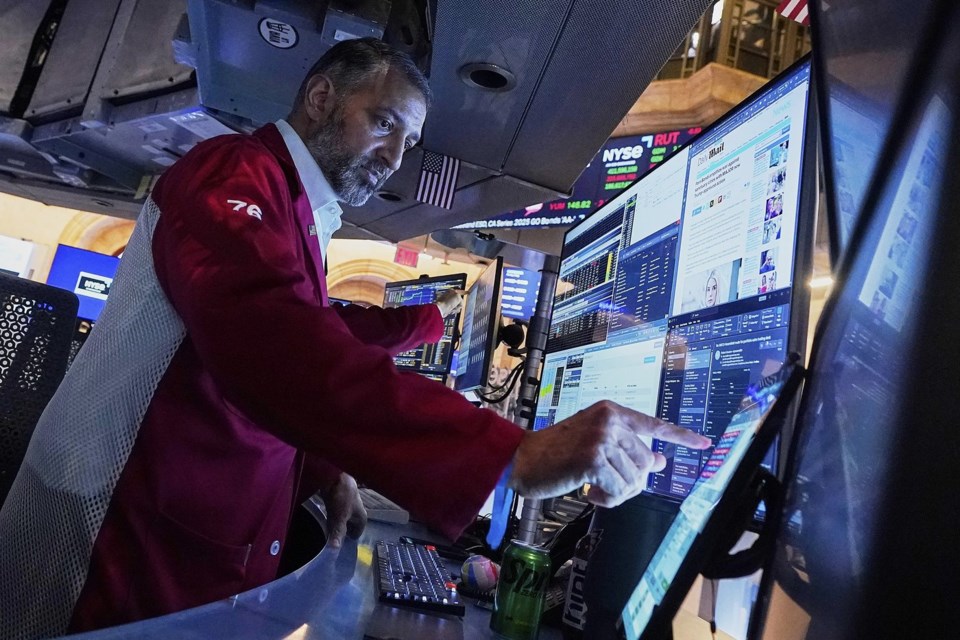NEW YORK (AP) — Stocks are opening lower on Wall Street, led by more weakness in technology companies. The S&P 500 lost 0.7% early Tuesday. The index broke a nine-day winning streak a day earlier. The Dow Jones Industrial Average fell 255 points, or 0.6%. The Nasdaq composite lost 1%. The declines came on the first day of a two-day meeting of Federal Reserve policymakers, where the central bank is expected to hold its benchmark interest rate steady. The Fed cut rates three times last year. Uncertainty over President Donald Trump’s tariffs has officials concerned about a potential resurgence of inflation.
THIS IS A BREAKING NEWS UPDATE. AP’s earlier story follows below.
Wall Street is pointing toward losses Tuesday ahead of a two-day meeting of the Federal Reserve, which is facing the diametrically opposed challenges of potential inflation and a softening employment landscape.
Futures for the S&P 500 lost 0.7% and futures for the Dow Jones Industrial Average retreated 0.6%. Nasdaq futures slid 1%.
The Fed is expected to hold its benchmark interest rate steady for the third consecutive meeting after trimming them three times to close out 2024. Uncertainty over President Donald Trump's trade policy — namely tariffs — has officials concerned about a potential resurgence of inflation, which has been hovering just above the Fed’s target rate of 2%.
The U.S. economy shrank 0.3% in the first quarter, the first drop in three years.
After enormous sell-offs with the market roiling from back-and-forth tariff announcements from the White House, Wall Street had been on a nine-day winning streak, its longest since 2004. That momentum lost steam Monday and the S&P 500 fell 0.6%.
This week's pause coincides with a growing number of U.S. corporations pulling guidance do to uncertainty about what the tariffs will bring, and spelling out the economic hits they'll take.
Shares of Ford Motor Co. fell 2.5% before the bell after the automaker said Monday it expects to take a $1.5 billion hit to its operating profit from tariffs this year. That followed General Motors, which last week trimmed its 2025 guidance and said it was anticipating a potential $5 billion tariff impact
Clorox sank 3.2% after it missed sales and profit targets in its most recent quarter and lowered its forecast to reflect “macroeconomic uncertainty” related to tariffs.
DoorDash tumbled more than 5% in premarket after the food delivery app said it was acquiring Britain’s Deliveroo for 2.9 billion pounds ($3.9 billion) in cash, expanding its business in Europe, Asia and the Middle East.
In reporting its most recent financial results, DoorDash said demand for deliveries remained strong in the first quarter, even as more Americans feel increasingly uneasy about the U.S. economy.
Elsewhere, markets in China advanced after reopening from “Golden Week” holidays.
When asked at a routine briefing about comments Trump’s comments on NBC that he won’t cancel tariffs on China to pave the way for trade talks, a Chinese Foreign Ministry spokesperson reiterated Beijing's stance that the U.S. “should stop threatening and pressuring and engage in dialogue with China on the basis of equality, respect, and mutual benefit.”
“If they want to fight, we will fight to the end; if they want to talk, the door is open,” Lin Jian said.
Late last week, China's Commerce Ministry said it was evaluating various U.S. missives about holding talks.
The Shanghai Composite index added 1% to 3,311.89, while the Hang Seng in Hong Kong was up 0.7% at 22,651.65.
A monthly survey measuring future activity in China's services sector fell to its lowest level ever, excluding the pandemic, in a further sign the escalation of Trump's trade war is hitting the world's second-largest economy.
A drastic increase in tariffs on U.S. imports of Chinese products, to 145%, has caused a sharp drop in shipping and other logistics.
“Overall optimism among Chinese firms weakened to the lowest level since this series began in April 2012, resulting in further job cuts in April,” said the report by Caixin, a financial media group.
However, reports showed a sharp increase in tourism revenues during the holidays that ended Monday, suggesting robust domestic demand, economists said.
Elsewhere in Asia, Australia's S&P/ASX 200 lost 0.2% to 8,148.40.
India’s Sensex fell 0.2%, while Taiwan’s Taiex slipped less than 0.1%. In Indonesia, the JSX was up 1%.
Germany’s DAX fell 1%, while the CAC 40 in Paris lost 0.4%. Britain’s FTSE 100 dipped 0.2%.
Oil prices gained more than $1 early Tuesday, bouncing back from a 4-year low following a decision by the OPEC+ group of oil producing nations to raise their output by 411,000 barrels per day as of June 1.
U.S. benchmark crude oil picked up $1.23 to $58.36 per barrel, while Brent crude, the international standard, surged $1.27 to $61.50 per barrel.
Elaine Kurtenbach And Matt Ott, The Associated Press




